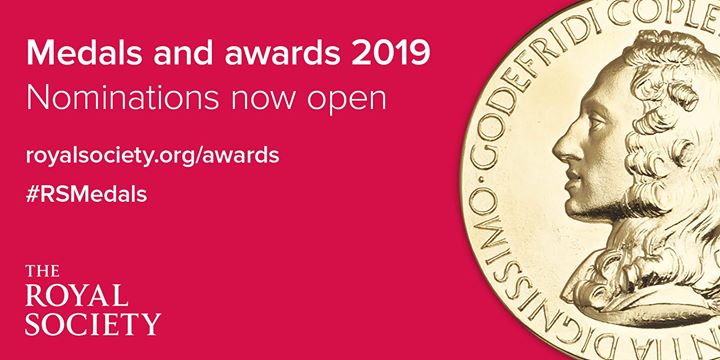
2019 Royal Society Medals and Awards
Deadline: January 28, 2019.
The call for nominations is now open.
The Royal Society has a broad range of medals including the Premier Awards, subject specific awards and medals celebrating the communication and promotion of science. All of these work to recognise and celebrate excellence in science.
ELIGIBILITY
1. Awards are open to citizens of a Commonwealth country or of the Irish Republic or those who have been ordinarily resident and working in a Commonwealth country or in the Irish Republic for a minimum of three years immediately prior to being proposed.
2. Three of our Premier Awards are open internationally and the Milner Award is open to European citizens and residents of 12 months or more.
3. Nominees cannot be members of the Royal Society Council, Premier Awards Committee, or the relevant selection committee.
4. Self-nominations are not accepted and members of the selection committee cannot nominate individuals for their own awards.
5. Nominations are valid for three cycles of the award unless otherwise stated. Nominators are given the opportunity to update nominations in December each year.
AWARDS
The following medals are now open for nominations:
1. Copley Medal
For outstanding achievements in any field of science (this year awarded for the physical sciences)
2. Royal Medals
For outstanding achievements in the physical, biological and applied sciences
3. Bakerian Medal and Lecture
Premier lecture in physical sciences
4. Croonian Medal and Lecture
Premier lecture in biological sciences
5. Royal Society Africa Prize
To recognise research scientists based in Africa who are making an innovative contribution to the biological sciences, including basic medical science, which contributes significantly to capacity building in Africa
6. Buchanan Medal
For distinguished contributions to the biomedical sciences
7. Clifford Patterson Medal and Lecture
For an outstanding researcher in the field of engineering
8. Darwin Medal
For work of acknowledged distinction in evolution, biological diversity and developmental, population and organismal biology
9. Davy Medal
For an outstanding researcher in the field of chemistry
10. Ferrier Medal and Lecture
For distinguished contributions on the structure and function of the nervous system
11. Francis Crick Medal and Lecture
Given on any field in the biological sciences. Preference is given to genetics, molecular biology and neurobiology, the general areas in which Francis Crick worked, and to fundamental theoretical work, which was the hallmark of Crick’s science
12. Gabor Medal
For acknowledged distinction of interdisciplinary work between the life sciences with other disciplines
13. Hughes Medal
For an outstanding researcher in the field of energy
14. Kavli Medal and Lecture
For excellence in all fields of science and engineering relevant to the environment
15. Leverhulme Medal
For an outstanding researcher in the field of chemical engineering and applied chemistry
16. Leeuwenhoek Medal and Lecture
To recognise excellence in the field of microbiology but now also includes excellence in bacteriology, virology, mycology and parasitology, and microscopy
17. Michael Faraday Prize and Lecture
To the scientist or engineer whose expertise in communicating scientific ideas in lay terms is exemplary
18. Royal Society Milner Award and Lecture
For outstanding achievement in computer science by a European researcher
19. Royal Society Mullard Award
To individuals whose work has the potential to make a contribution to national prosperity
20. Royal Society Rosalind Franklin Award and Lecture
To support the promotion of women in science, technology, engineering and mathematics
21. Rumford Medal
For an outstanding researcher in the field of physics
22. Sylvester Medal
For an outstanding researcher in the field of mathematics
23. Wilkins-Bernal-Medawar Medal and Lecture
Given on a subject relating to the history of science, philosophy of science or the social function of science
OFFICIAL LINK



